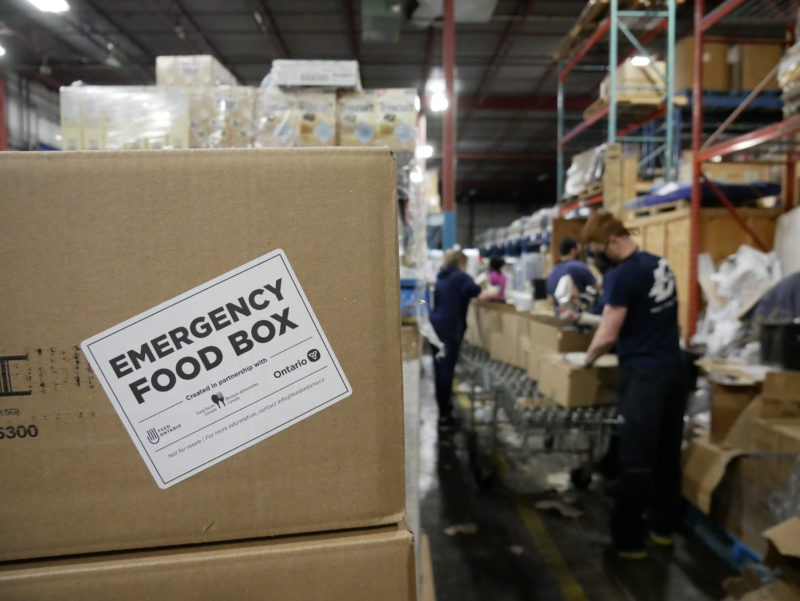Feed Ontario has launched a unique program to help support food banks deliver service throughout the pandemic
TORONTO, ON, May 6th, 2020 – Feed Ontario announced the launch of its new COVID-19 Emergency Food Box Program today, which will help Ontario’s food banks continue to support their communities while minimizing exposure to COVID-19.
Developed in partnership with local food banks and Food Banks Canada, and made possible by a generous contribution from the Government of Ontario, Feed Ontario’s COVID-19 Emergency Food Box Program is an innovative initiative that was designed to help food banks across the province address multiple challenges resulting from COVID-19 with a single solution.
“As COVID-19 continues to impact our communities, people are relying more heavily on food banks to help make ends meet,” says Carolyn Stewart, Executive Director at Feed Ontario. “But COVID-19 has also increased challenges for food banks, making it harder to acquire food locally and reducing the number of volunteers able to safely help distribute food.”
Feed Ontario’s COVID-19 Emergency Food Box Program centralizes a number of the usual processes that are needed to operate a food bank, including purchasing food items in bulk and pre-packing individual food boxes prior to distribution. By combining these efforts, the program helps to address local level labour shortages, support physical distancing measures, and meet the surge in demand by helping to address food shortages.
“Through the program, food banks across the province will receive pre-packed emergency food boxes with enough food for someone in need to stay home for a full week,” says Stewart. “However, Feed Ontario has set an ambitious goal: to produce enough boxes for everyone who visits a food bank in Ontario to receive 14 days’ worth of food, or two boxes each.”
The COVID-19 Emergency Food Box Program was developed in a matter of weeks, with the generous support of business and industry partners, including financial contributions from longstanding partner Metro Ontario Inc. and Ontario Power Generation, as well as logistics support from AMJ Campbell.
“These unprecedented times highlight the importance of working together,” Stewart says. “The strength and resilience that Ontario’s food bank network has shown in the last few weeks, and the incredible support of its partners, is a testament to the amazing things we are able to achieve together, even in the most extreme of circumstances.”
Feed Ontario program partners echoed these sentiments:
“Individuals across our province have been affected by COVID-19, and we know it has been particularly difficult for those living in poverty, facing homelessness, or dealing with precarious employment or unemployment,” said Todd Smith, Minister of Children, Community and Social Services. “That is why our government is proud to partner with Feed Ontario on their COVID-19 Emergency Food Box Program.
We commend Feed Ontario on their efforts to address the challenges facing our local food banks, and for presenting an innovative solution. This investment will go a long way towards ensuring our most vulnerable and their families are kept safe, healthy and supported during this uncertain time.”
“This is an example of every piece of the puzzle falling into place. Every level of food banking, federal, provincial and local, is participating to make sure our neighbours are fed and safe. We’re always happy to collaborate with Feed Ontario,” says Chris Hatch, CEO, Food Banks Canada.
To date, the program has distributed 100,000 emergency food boxes to food banks in Ontario, with a target of producing and distributing 450,000 pre-packed boxes in total. Each box provides approximately seven days’ worth of food per person, including staple products like cereal, tuna, pasta, canned fruit, and juice. Food banks are then able to add to the boxes with local fresh food items, like milk, eggs, meat, and produce.
Feed Ontario has received more than $200,000 from caring Ontarians in support of the program, as well as generous financial donations from organizations including Hydro One, Ontario Toyota Dealers and Toyota Canada, Grain Farmers of Ontario, Dairy Farmers of Ontario, National Bank of Canada, and the Elementary Teacher’s Federation of Ontario.
“Feed Ontario would not have been able to accomplish this incredible feat so far without the support of its donors and partners,” says Stewart. “But the need in our province is great, which is why we will need continued support to maintain this momentum and achieve our goal.”
Ontario’s food bank network is currently preparing to serve 225,000 people per month, an increase of nearly 20 percent over January. As the impact of COVID-19 continues to develop, food banks will need ongoing support in order to meet the increasing demand for their services and address the long-term impact that COVID-19 may have on communities across the province.
